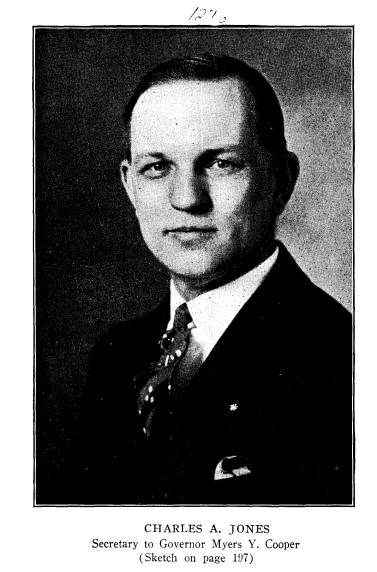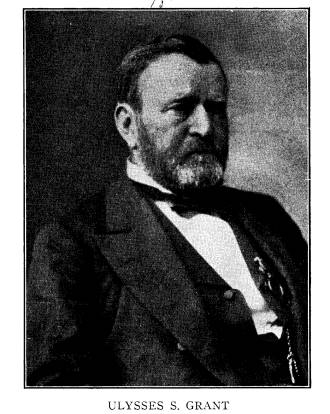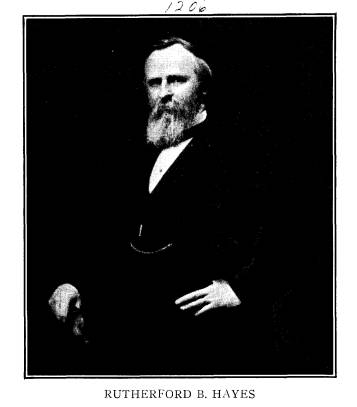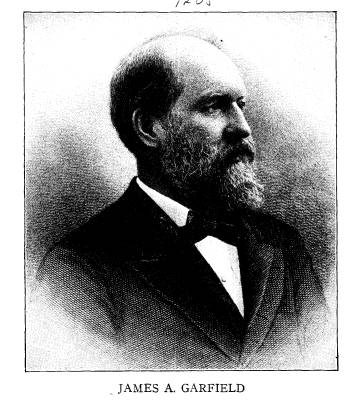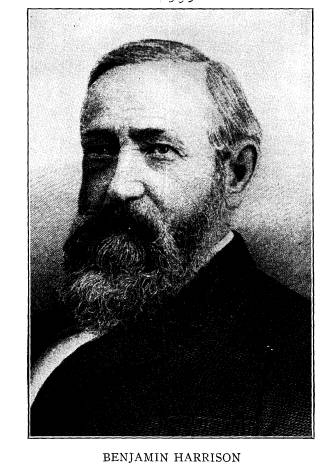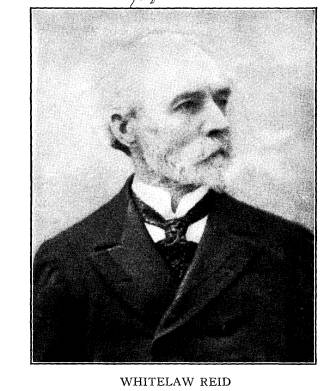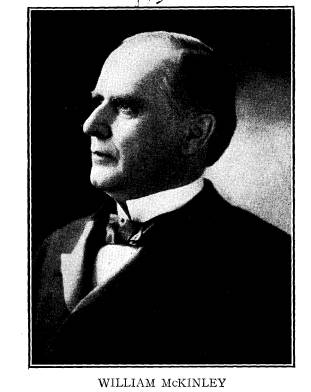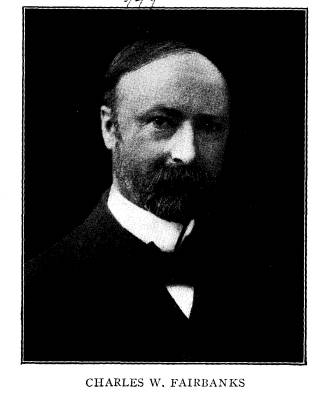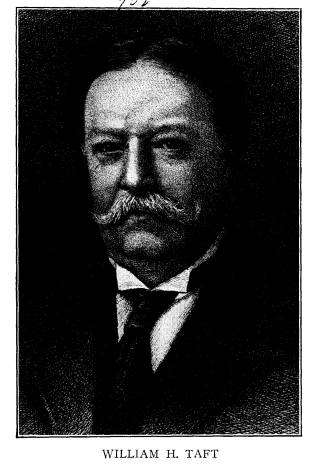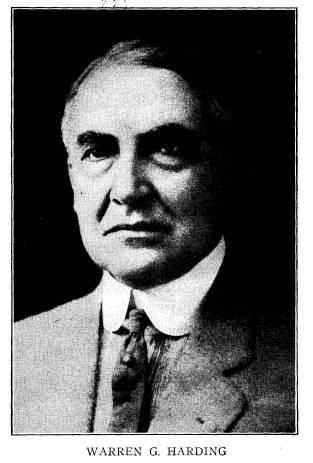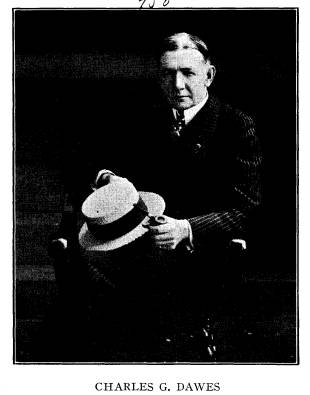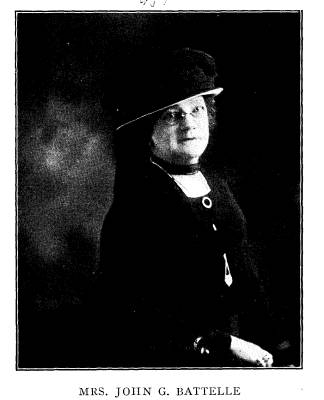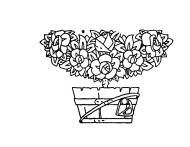Ohio History Journal
OHIO
Archaeological and Historical
SOCIETY PUBLICATIONS
OHIO IN THE REPUBLICAN NATIONAL
CONVENTIONS
BY CHARLES A. JONES
Since the organization of the
Republican party in
1854, there have been nineteen national
conventions of
the party. Only two of these have been
held within the
borders of Ohio, but in their
proceedings, taken as a
whole, no other state has even
approximately played the
prominent part that has been given to
sons of the Buck-
eye State. The nineteen volumes which
officially record
the proceedings of these great
conventions are full of
the sayings and doings of men from
Ohio.
From eleven of the nineteen
conventions, sons of
Ohio have emerged as nominees for
President, and from
four others, as nominees for
Vice-President. In only
five of the nineteen has no Ohio man
been placed on
the ticket. Hayes, Garfield, McKinley
(twice), Taft
(twice), and Harding were actual
residents of Ohio
when nominated for President. Grant and
Benjamin
Harrison, each nominated twice, were
sons of the state
who resided elsewhere when nominated.
Reid in 1892,
Fairbanks in 1904 and 1916 and Dawes in
1920 were
Ohio's Vice-Presidential sons. No
actual resident of
(1)
2 Ohio Arch. and Hist. Society Publications
Ohio at the time of nomination has been
named for
Vice-President. This is in striking
contrast with the
neighboring state of Indiana, which has
secured the
place of Vice-President often, but
whose only nominee
for President was the second Harrison,
a son of Ohio.
United States Senator C. C. Dill, of
Washington
state--himself a son of Knox County,
Ohio--empha-
sized this remarkable record at the
memorial service in
the United States Senate for the late
Senator Frank
B. Willis when he said: 'Every
Republican President
who has entered the White House by the
votes of the
people since the Civil War has come
directly from Ohio
or been born in Ohio. The only other two
Presidents
of the Republican Party who entered the
White House
have entered by way of the
Vice-Presidency." Herbert
Hoover, elected in November, 1928, is
the first to break
the record in this respect.
Not only have Ohio men carried off more
of the
prizes, but the state has to its
credit, also, the two
speeches, which, of the many,
contributed directly to
producing a nomination. Garfield's
memorable speech
for John Sherman in 1880, especially
great because of
its contrast in setting and in spirit
with that of Roscoe
Conkling for Grant, might have helped
Sherman had
the situation developed differently; as
it was, the speech
helped to nominate the man who made it.
The presen-
tation of the name of Warren G. Harding
in 1920 by
his successor in the United States
Senate, Frank B. Wil-
lis, is given credit as being the only
nominating speech
that, to a substantial extent, actually
helped the man for
whom it was intended.
The two presentations of the name of
William Mc-
|
|
|
(3) |
|
4 Ohio Arch. and Hist. Society Publications Kinley by Joseph B. Foraker, in 1896 and in 1900, were examples of splendid eloquence. William H. West of Bellefontaine, "Blind man eloquent," presented the name of Blaine in 1884; Theodore E. Burton presented the |
|
|
|
names of Taft in 1908 and of Warren G. Harding in 1912. But all of these merely contributed to the setting of a conclusion already almost predetermined. An Ohio man, Joshua R. Giddings, possibly with the co-operation of Salmon P. Chase, another distinguished |
Ohio in the Republican National
Conventions 5
son of the state, wrote the first
Republican national
platform in 1856. McKinley twice
presented the plat-
form report, in 1884 and in 1888.
Foraker presented
the platform in 1892 and 1896. Mark
Hanna had much
to do with its writing in 1896 and in
1900. William
Dennison, Jr., was permanent chairman
in 1864, Mc-
Kinley in 1892, and Harding in 1916.
Theodore E.
Burton was temporary chairman in 1924
and Simeon
D. Fess in 1928.
Senators Foraker and Burton tie for participation
in
more conventions than have been
allotted to any other
sons of Ohio. Each officially
participated in six, but
Senator Foraker's record was more
notable than has
been that of Senator Burton, for in all
six he was
accorded the high honor of being a
delegate-at-large,
sitting as such successively from 1884
to 1904. But few
men of Ohio have been, even twice,
delegates-at-large.
Once Senator Foraker placed Senator
John Sherman in
nomination, once he seconded Sherman's nomination,
twice he presented the name of
McKinley, twice he was
chairman of the Resolutions Committee.
Then in 1908,
his name was formally presented for the
Presidential
nomination, although his candidacy was
largely over-
shadowed by that of his fellow townsman.
William
Howard Taft.
Theodore E. Burton was a district
delegate in 1904,
1908 and 1920. He was a
delegate-at-large to the con-
ventions of 1912 and 1928. In 1908, he
presented the
name of the nominee, Mr. Taft; in 1916
he was Ohio's
candidate for the Presidency. In 1920
he was tem-
porary chairman and
"keynoter," receiving a substan-
6 Ohio Arch. and Hist. Society Publications
tial complimentary vote for
Vice-President in the early
balloting for that office.
Former Governor Myron T. Herrick, later
the dis-
tinguished ambassador of the United
States to France,
sat on the Ohio delegation in five
conventions, in 1888
and in 1896 as a district delegate, in
1904, 1908 and
1920 as a delegate-at-large. He
seconded the nomina-
tion of former Senator Irvine L.
Lenroot of Wisconsin,
for Vice-President in 1920.
There is an interesting story in the
sequence of parts
coming to William McKinley and Warren
G. Harding
in the record of the conventions. They
grew from honor
to honor. Note this progress:
McKinley: 1884, Delegate-at-Large,
Chairman Res-
olutions Committee; 1888,
Delegate-at-Large, Chair-
man Resolutions Committee; 1892,
Delegate-at-Large,
Chairman of the Convention, Recipient
of many votes
for the Presidency; 1896 and 1900,
Presidential nom-
inee.
Harding: 1904, Alternate-at-Large;
1912, Delegate-
at-Large; 1912, Delegate-at-Large,
Presented Taft's
name; 1916, Delegate-at-Large, Chairman
and keynote
speaker; 1920, Presidential nominee.
The story of Ohio in the conventions,
however, has,
despite these splendid records, been
somewhat like the
alleged course of true love. The
delegates from the
Buckeye state have achieved some
unenviable reputation
for their instability and lack of
unity. "Ohio delegates
seldom
'stay put'--they were an unstable lot then
(1880)--as always," says Henry L.
Stoddard in his
delightful book, As I Knew Them, recently
issued. In
this he voices a feeling expressed over
and over again
Ohio in the Republican National
Conventions 7
in writings relative to the various
Republican National
Conventions. In 1920, even the
Associated Press dis-
patches reporting a change of
Cincinnati votes from
Harding to Wood stated that "the
time had come for
Ohio to make its expected and usual
breakup." The
feeling that Ohio delegations cannot be
relied upon
creeps into the speeches of Ohio
leaders from time to
time even in the official proceedings
of the convention.
It is an interesting contrast to the
fact that so many
nominations have come to Ohio.
The first, perhaps, to suffer
materially from this lack
of unity, was Salmon P. Chase in 1860.
Murat Hal-
stead, distinguished journalist of
Cincinnati, wrote for
his paper at the time a vivid account
of the discordant
elements present in the Ohio delegation
from which
came the final votes needed to nominate
Abraham Lin-
coln. In 1868, Senator Benjamin Wade
was slaugh-
tered for the Vice-Presidential
nomination by his own
delegation. Because the delegation
would not stand by
instructions, Governor Dennison would
not permit the
presentation of his name for
Vice-President to the Con-
vention of 1872. Although Ohio men secured
the nomi-
nation in 1880 and in 1888, John
Sherman always felt
his own state more responsible than
anything else for
the fact that he was not so
honored--and his conclusions
in this regard are confirmed by the
impressions of nu-
merous others prominent at the
time. Sherman's
tenacious hold on the delegation in
1888 was held by
Senator Foraker to have eliminated his
only chance.
Although nominated, Taft had to contend
with a divided
delegation in 1912 and Harding in 1920.
Theodore E.
Burton suffered from rebellious
elements, especially
8
Ohio Arch. and Hist. Society Publications
from Cincinnati, in 1916, and could not
command any-
thing like united support, after the
first ballot, when
spontaneously proposed as a candidate
for Vice-Presi-
dent at Cleveland in 1924. A delegation
that never
united, and part of which refused at
the end to vote for
the nominee, was sent to Kansas City in
1928. There
are those, prominent in the nation, who
do not hesitate
to say that the day for honors to sons
of Ohio is over
unless the record of the future carries
less of discord in
the Ohio delegations.
In the earlier days of the party, the
National Com-
mittee did not receive the place of
prominence that it
holds today. From the beginning until
the adoption of
suffrage for women, each state had one
member on that
committee. Since the adoption of the
nineteenth amend-
ment, each state has had one man and
one woman as a
member. The list from Ohio is as
follows:
1856--Alfred P. Stone, Columbus. After
his resig-
nation, Thomas Spooner, of Hamilton
County.
1860--Thomas Spooner, Hamilton County.
1864--G. B. Senter, Cuyahoga County.
1868 and 1872--B. R. Cowen, Bellaire.
1876--A. T. Wikoff, Columbus,
(Resigned); E. F.
Noyes, Columbus.
1880--W. C. Cooper, Knox County.
1884--A. L. Conger, Akron.
1888--Charles Foster, Fostoria.
1892--William M. Hahn, Mansfield.
1896--Charles L. Kurtz, Columbus.
1900--George B. Cox, Cincinnati.
1904--Myron T. Herrick, Cleveland.
1908--A. I. Vorys, Lancaster.
Ohio in the Republican National Conventions 9
1912--Sherman Granger, Zanesville.
1916-1920--R. K. Hynicka, Cincinnati.
1924--Maurice Maschke, Cleveland, and
Mrs. John
Gordon Battelle, Columbus. (After Mrs. Battelle's
death, there was a vacancy for a time,
and then, in 1927,
Mrs. Wilma Sinclair LeVan,
Steubenville, was elected
as her successor.)
1928--Maurice Maschke, Cleveland; Mrs.
Hugh
Clark, Steubenville.
The detailed story of Ohio's
participation in Repub-
lican National Conventions follows:
Alfred P. Stone, Chairman of the
Republican State
Committee and a little later State
Treasurer, was one
of five signers calling the initial
national gathering of
the party, which met at Pittsburgh on
February 22,
1856, for the purpose of perfecting the
National or-
ganization and providing for a national
delegate con-
vention. To this Pittsburgh meeting,
each state was
privileged to send as many persons as
desired to attend,
and Ohio stood next to New York in
point of numbers.
The most noted of these were Joshua R.
Giddings,
in Congress and at the height of his
fame; William Den-
nison, Jr., a future Governor; Joseph
Medill, subse-
quently famous as editor of the Chicago
Tribune; Su-
preme Judge Jacob Brinkerhoff,
LaFayette G. Van
Slyke, John A. Foote, and Rufus
Spalding, all of whom
took special part in the proceedings.
Giddings spoke
twice, once challenging Greeley's plea
for caution and
delay, and once prophesying that with
the new party,
he could anticipate the end of the
slavery question. His
speeches appear to have been electrical
in their effect.
Stone was named as Ohio's first
Republican National
10
Ohio Arch. and Hist. Society Publications
Committeeman. While Cincinnati and
Cleveland were
both considered for the forthcoming
National Conven-
tion, Philadelphia was chosen for
strategic reasons.
In the first regular convention,
assembled in the
Quaker City on "Bunker Hill"
day, each state had six
delegates-at-large and three from each
district. By the
time of the 1860 convention which was
held in the city
of Chicago, this was reduced to four at
large and two
for each district, which ratio remained,
except in 1872
and 1912, until 1924, when a desire to
give northern
states larger representation in
proportion to the Repub-
lican vote, gave Ohio seven at large.
Thomas Spooner
of Hamilton, Rufus P. Spalding of
Cuyahoga, William
Dennison, Jr., and Alfred P. Stone of
Franklin, John
Paul of Defiance, and Ephraim R. Eckley
of Carroll,
were the first convention's
delegates-at-large from Ohio.
Alphonso Taft, father of President
Taft; George
Hoadly, afterwards Governor; James M.
Ashley, who
later moved for the impeachment of
President Andrew
Johnson; Joshua R. Giddings, Thomas
Bolton; were
among the distinguished group
representing the dis-
tricts.
Ohio men had prominent parts in all
phases of the
convention. George Hoadly, with Moses
E. Grinnell of
New York, escorted the temporary
chairman to the plat-
form; Alfred P. Stone and Francis D.
Kimball made the
motions from which the usual
organization committees
resulted. Thomas Spooner became
National Commit-
teeman; Noah H. Swayne, of Toledo, and
Rufus P.
Spalding, of Cuyahoga, became
Vice-Presidents, and
A. Sankey Latty, Secretary for Ohio.
The platform is
said to have been largely written by
Joshua R. Giddings.
Ohio in the Republican National
Conventions 11
The old-line Whigs had determined to
nominate
George John McLean, of the United
States Supreme
Court, and great confusion resulted
when Judge
Spalding read a letter withdrawing
McLean's name.
Another sensation was created when
Thomas G. Mitch-
ell, of Hamilton, similarly withdrew
the name of Gov-
ernor Salmon P. Chase. McLean's name
was later re-
stored for consideration and he
received numerous
votes. On the formal ballot, Ohio gave
Fremont, the
nominee, 55 votes and McLean 14.
Prophetic of future days was Judge
Spalding's
question, during consideration of the
nominees for Vice-
President. The name of Abraham Lincoln
had been
presented by Illinois, and Judge
Spalding asked: "Can
Mr. Lincoln fight?"
Colonel Archer, of Illinois, is said to
have jumped
at least eighteen inches from the
floor, gesturing em-
phatically with both arms, as he
answered emphatically,
"Yes. Have I not told you he was
born in Kentucky?
He's strong mentally, he's strong
physically, he's strong
every way."
The incident, however, probably hurt
rather than
helped Lincoln's chances in this
convention. Ohio voted
65 for William L. Dayton of New Jersey,
the nominee,
2 for Lincoln, 1 for Wilmot and 1 for
Clay.
In all the history of Republican
National Conven-
tions, with many dramatic scenes
centering around sons
of Ohio, there is no more dramatic
story than that cen-
tering around the convention of 1860.
To Ohio fell the
great privilege of casting the votes
that finally made
Abraham Lincoln the nominee. It is,
however, quite
within the range of possibility that,
if the delegation
12
Ohio Arch. and Hist. Society Publications
had not begun, with this convention,
the history of dis-
united delegations that has given the
state's representa-
tion in Republican National Conventions
no little dis-
favor, the nominee might have been
Salmon P. Chase
of Ohio.
Chase had been endorsed, 383 to 69, by
the State
Convention, but the delegation was by
no means a unit
for him. There was a faction for
"Old Ben" Wade, and
another for Judge McLean. Writing to
the Cincinnati
Commercial, on the evening of the convention's first
day, Murat Halstead, who has left the
most vivid ac-
count of the proceedings extant, said:
"The Ohio dele-
gation continues so divided as to be
without influence.
If united it would have a favorable
influence, and might
throw the casting votes between
candidates, holding
the balance of power between the East
and the West."
Halstead and others discuss this
division in Ohio as
having a most important bearing on the
convention's
outcome. The Wade movement, born in
Washington
and possibly tied up to some extent by
senatorial aspira-
tions of some of its promoters, had
little chance of itself,
but it, together with McLean's Whig
remembrances of
Chase's alliance with Democrats twelve
years before in
a Senatorial fight, were sufficient to
eliminate Chase
"whose very greatness made him a
weak candidate,"
in the words of Professor Albert
Bushnell Hart.
D. K. Cartter, of Cleveland, afterwards
Chief Jus-
tice of the District of Columbia; V. B.
Horton, of Pom-
eroy; Thomas Spooner, of Reading; and
Conrad Broad-
beck, of Dayton, were Ohio's
delegates-at-large.
Former Senator Thomas Corwin, of
Lebanon, one of
Ohio's greatest men; William H. West,
"Blind man
Ohio in the Republican National
Conventions 13
eloquent" of Bellefontaine;
Jonathan Renick, of Cir-
cleville, grandfather of the present
Assistant Secretary
of Agriculture; Columbus Delano, of Mt.
Vernon, fu-
ture Secretary of the Interior; and
Joshua R. Giddings
were among distinguished names in the
delegate list.
Samuel Stokely, of Steubenville, sat on
the Committee
of Credentials, R. M. Corwine, of
Cincinnati, on Busi-
ness, and Joseph H. Barrett, of Cincinnati,
on Resolu-
tions. George D. Burgess, of Troy, was
Ohio's Vice-
President, and H. Y. Beebe, of Ravenna,
Secretary.
When the resolutions were presented,
the venerable
Joshua R. Giddings offered an amendment
which came
close to having a vital effect upon the
future develop-
ments of the convention. The amendment
provided that
"we solemnly reassert the
self-evident truths that all
men are endowed by their creator with
certain inalien-
able rights, among which are those of
life, liberty and
the pursuit of happiness; that
governments are insti-
tuted among men to secure the enjoyment
of these
rights."
When this was defeated, Mr. Giddings
arose and
made his way slowly towards the door;
even the Decla-
ration of Independence, as he thought,
had been voted
down. Delegates begged him to stay, and
finally, when
he reached the New York delegation, he
yielded. A
little later, George William Curtis
secured substantially
the same provision in a different way,
and so saved the
day.
Nominating speeches in those days were
not the
long drawn-out affairs they have since
become. Scarcely
ten minutes was required for
presentation of all the
names. Thomas Corwin presented "at
the request of
14
Ohio Arch. and Hist. Society Publications
many gentlemen," the name of John
McLean. Colum-
bus Delano, "on behalf of a
portion of the delegation
from Ohio" rose "to put in
nomination the man who
can split rails and maul
Democrats--Abraham Lincoln."
Mr. Cartter presented the name of
Governor Chase.
Then the Convention voted. Ohio gave
Lincoln 8 votes,
McLean 4 and Chase 34. Chase had a
total of 49 votes
and McLean 12. Wade received 3. On the
second bal-
lot, Lincoln received 14 from Ohio,
McLean 5 and Chase
29. Chase's total went down to 42 1/2.
The dramatic
moment was approaching.
In the third ballot, Ohio gave Chase
15, McLean 2,
and Lincoln 29 votes. As the roll was
concluded, Lin-
coln had within 1 1/2 votes of enough.
Halstead tells
the story best:
"The news went over the house
wonderfully, and
there was a pause. There are always men
anxious to
distinguish themselves on such
occasions. I looked up
to see who would be the man to give the
decisive vote.
In about ten ticks of a watch Cartter,
of Ohio, was up.
I had imagined Ohio would be slippery
enough for the
crisis; and sure enough; every eye was
on Cartter, and
everybody who understood the matter at
all knew what
he was about to do. ... He has an
impediment in his
voice, which amounts to a stutter. He
said: 'I rise (eh),
Mr. Chairman (eh) to announce the
change of four
votes of Ohio from Mr. Chase to Mr.
Lincoln.' The
deed was done. There was a moment's
silence . . .
there was a noise in the Wigwam like
the rush of a
great wind in the van of a storm; and
in another breath
the storm was there." Beebe,
Cartter, Hassaurek, of
Ohio in the
Republican National Conventions 15
Cincinnati, and
Corwin were the four delegates whose
votes had been
changed.
Ohio supported
Hannibal Hamlin of Maine for
Vice-President with
all 46 votes on both ballots.
The Convention of
1864, which met in Chicago, was
known as the
"National Union Convention." Ohio's
delegates-at-large
were William Dennison, David Tod,
governors; Columbus
Delano of Mt. Vernon, and G.
Volney Dorsey of
Columbus. New names made up the
district delegate
list. Other than locally, there is not a
famous name in the
list.
Governor Dennison
became the permanent chair-
man, David Tod,
Vice-President from Ohio; J. C.
Devin, of Mt. Vernon,
secretary. Aaron F. Perry, of
Cincinnati,
represented the state in the Committee on
Resolutions, Mr.
Dorsey on Credentials. E. F. Drake,
of Xenia, was
Chairman of the Committee reporting
Permanent Rules. Ohio
took only a minor part in the
discussions. The
state voted solidly for Andrew John-
son for
Vice-President.
Ohio was strong for
the program determined upon
in advance to
nominate General Ulysses S. Grant for
President at what was
this time "The National Union
Republican
Convention," assembling in Chicago, May 20
and 21, 1868. The
state convention endorsed Grant,
and with some less
degree of unanimity, Benjamin F.
Wade, for
Vice-President. It strongly
denounced
President Andrew Johnson. The
delegates-at-large
were Frederick
Hassaurek, talented German-American
orator and editor of
Cincinnati; John C. Lee, of To-
ledo; John A.
Bingham, of Harrison; and James Scott,
of Warren. Thomas C.
Jones, of Delaware, was Chair-
16
Ohio Arch. and Hist. Society Publications
man of the delegation; Orville C.
Maxwell, of Dayton,
Secretary; James Scott, Committeeman on
Credentials;
John C. Lee, Committeeman on
Resolutions. The dele-
gation at its meeting voted that from
first to last the
vote of Ohio should be cast for
Benjamin F. Wade as a
candidate for Vice-President. The
failure to live up to
this resolution helped to defeat Wade
and added to the
reputation Ohio's delegation had gained
in 1860 for in-
consistency.
Mr. Hassaurek gave a very scholarly,
although
somewhat lengthy address to the
convention, and Ohio
took part in the general discussions.
When the roll for
nomination of Grant was called,
Chairman Jones re-
sponded: "Ohio has the honor of
being the mother of
our great Captain. Ohio is in line, and
on that line
Ohio proposes following this great
Captain, who never
knew defeat; to fight it out through
the summer, and
in the autumn, at the end of the great
contest, and to
be first in storming the intrenchments,
until victory shall
be secured, and all the stars that
glitter in the firma-
ment of our glorious constellation
shall again be re-
stored to their proper order, and all
the sons of freedom
throughout the whole earth shall shout
for joy." Grant
received all the state's 42 votes.
Chaplain McCabe, of
Athens, was one of a trio that stirred
the convention
with a song especially written by
George F. Root, of
Erie County, on the theme, "We'll
Fight it Out Here."
Mr. Hassaurek presented the name of
Wade for
Vice-President, emphasizing his
reputation as "Honest
Ben." Carl Schurz, of Missouri, Rufus Spalding, of
Ohio, and Jones of North Carolina
seconded it. But
he did not secure the nomination. On
the first ballot,
Ohio in the Republican National
Conventions 17
the Ohio delegates followed their
resolution and voted
solidly for Wade. On the second ballot,
four swung to
Colfax of Indiana; on the third ballot,
five; then six.
There was just enough desertion to
break Wade's line.
At the end, in seconding General
Sickles' motion that
the nomination of Colfax be made
unanimous, Chair-
man Jones, of the Ohio delegation,
said: "Was there
ever such a contest as this, in which
Ohio had the lead-
ing nag in the race, and nearly had the
leading nag on
the home stretch, and yet is denied the
poor privilege of
first congratulating the
winner?" Three cheers for
Ohio and three cheers for Wade ended
the incident.
B. R. Cowen, of Bellaire, became
National Commit-
teeman.
Four years later, the "National
Union Republican
Convention" again met at
Philadelphia, June 5 and 6,
1872. Ohio Republicans stood for the
renomination of
President Grant but desired former
Governor William
Dennison for Vice-President. The
delegates-at-large
were Jacob Mueller, Cleveland; Samuel
Craighead,
Dayton; J. Madison Bell, Toledo; and
Henry Kessler of
Hamilton. The alternates were Samuel M.
Titus, of
Meigs; William A. Walden, of Jefferson;
Joseph Bruff
of Mahoning and Sylvester Everett, of
Cuyahoga.
Rutherford B. Hayes was Ohio's
representative on the
Resolutions Committee. E. F. Noyes, of
Columbus;
T. W. Saunders, of Youngstown; W. D.
Bickham, of
Dayton; Aaron Pardee of Wadsworth were
well-known
names on the delegation. H. S. Bundy,
father-in-law
of J. B. Foraker, was an
alternate-at-large. B. R.
Cowen was again elected a member of the
National
Committee.
Vol. XXXVIII--2
18
Ohio Arch. and Hist. Society Publications
Seconding the nomination of Grant, Ohio
pledged
him a fifty thousand majority. Once
again, division
appeared in the delegation regarding
support of an Ohio
candidate for Vice-President, and
learning of the same,
Governor Dennison peremptorily withdrew
his name.
It was not presented. Governor Noyes
spoke for Henry
Wilson of Massachusetts and Mr. Bickham
spoke for
Mr. Colfax of Indiana. Wilson received
30 of the Ohio
votes and Colfax 14.
The word "Union" was no
longer a part of the
party name as reported for the
Convention of 1876.
The gathering at Cincinnati, June 14,
15 and 16, was
simply a "Republican National
Convention." Such
simple things as danger from lighting
new gas fixtures
for an evening session, necessitating
an over-night ad-
jolurnment; a slight sunstroke suffered
by James G.
Blaine the Sunday preceding the
Convention, and a re-
buffed call of sympathy, played, in this
Convention,
master parts for destiny and helped to
bring about the
nomination of Ohio's Governor,
Rutherford B. Hayes,
for the Presidency. The Convention was
also to put
into force the vital and far-reaching
rule that delegates
could vote as individuals and not be
bound by state unit
rules.
It is interesting to note that, upon
this most impor-
tant decision, affecting every
Convention thereafter,
Ohio voted 30 to 14 for the unit rule.
Ohio's delegates-at-large to this
Convention were
Benjamin F. Wade, of Jefferson,
appearing for the last
time; Governor Edward F. Noyes, of
Cincinnati; J.
Warren Keifer, of Springfield, Speaker
of the National
House of Representatives; and William
H. Upson, of
|
Ohio in the Republican National Conventions 19 Akron. Charles H. Grosvenor, of Athens, was an al- ternate-at-large as was Samuel Craighead, of Dayton, chairman of a former convention delegation. Wade was Ohio's Vice-President, and L. J. Critchfield, of Co- |
|
|
|
lumbus, Secretary. Edwin C. Cowles, of Cleveland, was on the Resolutions Committee. Robert G. Ingersoll, in presenting the name of James G. Blaine, made his famous "Plumed Knight" speech, one of the most famous of the national convention ad- dresses. The name of Governor Hayes was presented |
20
Ohio Arch. and Hist. Society Publications
by General Edward F. Noyes and seconded
by Benja-
min F. Wade, Augustus St. Gem, of
Missouri, and James
W. Davis, of West Virginia. On the
first ballot Hayes
had but 61 votes, while Blaine had 285.
After the sixth
ballot, in which Hayes climbed to 113
votes, the anti-
Blaine forces withdrew five candidates,
with the result
that the seventh ballot stood: Hayes
384, Blaine 351,
Bristow, of Kentucky, 21. Hayes was
nominated. Ohio
voted for him solidly on every ballot.
William A.
Wheeler received the Ohio votes for
Vice-President
and was the nominee. A. T. Wikoff, of
Columbus, be-
came Ohio's member of the Republican
National Com-
mittee, but resigned and Edward F. Noyes
succeeded
him.
James A. Garfield, whom Joseph G.
Cannon, of Il-
linois (afterwards the famous
"Uncle Joe"), classed in
a conversation with the late Senator
Willis as "beyond
all question the most brilliant
statesman of all that I
have known", was the outstanding
figure of the turbu-
lent Seventh Republican National
Convention, held in
Chicago, June 2 to 8, 1880. Garfield,
as the newly
elected Senator from Ohio, went to the
Convention as
leader of the forces favoring the
nomination of John
Sherman for President. Destiny was to
make him a
leader in much more than that. He was
the outstanding
contender against the third-term
proposal for General
Grant, and as such was dramatically
before the Con-
vention, first in opposition to the motion
of the pompous
Roscoe Conkling by which all delegates
would be bound
to support the nominee; and soon after,
as Chairman
of the Committee on Rules, presenting a
resolution af-
firming the 1876 Convention's action
and eliminating
|
Ohio in the Republican National Conventions 21 the unit rule. Garfield's courteous conduct, in striking contrast to the sneering, overbearing attitude of Conk- ling, won for him an affection in the Convention seldom given any man. |
|
|
|
The scene connected with the nominating speeches at this Convention has been often described; in no other convention of any party, save perhaps at the Demo- cratic Convention of 1896, has there been anything even approaching it in dramatic intensity. Roscoe Conkling presented the name of General Grant, but before he |
22 Ohio Arch. and Hist. Society Publications
could begin his speech, there was a
demonstration last-
ing almost fifteen minutes. As Mr. Stoddard says:
"Then, in a deep tone that sounded
through that meet-
ing hall like a great cathedral organ,
he began the
memorable speech for Grant--
"'And when asked what State he
hails from
Our sole reply shall be,
He hails from Appomattox
And its famous apple tree.'"
A full half-hour of tumult followed the
conclusion of
the speech; a tumult that was not
planned deliberately
as have been most of the demonstrations
in the later
conventions.
Into this tumult came Garfield, waiting
until it sub-
sided before beginning his speech in
behalf of Sherman.
Few knew better than he that if he were
to win, it must
be by the element of contrast, for his
powers were of
a far different order from those of
Conkling. Waiting,
at the same table from which Conkling
had spoken, until
the tumult had quieted, the Ohio statesman
began with
a description that is unequaled in all
the history of na-
tional convention oratory. These were
his opening
words:
Mr. President, I have witnessed the
extraordinary scenes
of this Convention with deep solicitude.
Nothing touches my heart
more quickly than a tribute of honor to
a great and noble char-
acter; but as I sat in my seat and
witnessed this demonstration,
this assemblage seemed to me a human
ocean in tempest. I have
seen the sea lashed into fury and tossed
into spray, and its gran-
deur moves the soul of the dullest man; but I remember
that it is
not the billows but the calm level of
the sea from which all
heights and depths are measured.
When the storm is past and the hour of
calm settles on the
ocean, when the sunlight bathes its
peaceful surface, then the
Ohio in the Republican National
Conventions 23
astronomer and surveyor take the level
from which they measure
all terrestrial heights and depths.
"Not in the turbulent
convention," he continued,
"but by 4,000,000 of Republican
firesides, in the quiet
hours, there God prepares the verdict
which will de-
termine the wisdom of our work
tonight," Garfield went
on.
Garfield's calmness and force soon made
the Conven-
tion forget Conkling's satire and
invective. Like a tidal
wave the feeling went over the delegates
that here was
really "the man of the hour"
in case of a deadlock.
When he asked, "What does the
convention want?" a
voice from the gallery disrupted the
Convention by
shouting, "We want Garfield."
One of the greatest of
all the nominating speeches, it did not
help Sherman,
but it made Garfield a place among the
American im-
mortals. Forty years later, another son
of Ohio, re-
membering these scenes of which he had
read and often
talked, familiar with the effect, used
much the same
tactics to aid in bringing about the
nomination of
another Ohio candidate for the
Presidency.
The Convention could not nominate by
Saturday
night and went over Sunday. Sherman
received 93
votes. Ohio again added to her
reputation for uncer-
tainty in Republican National
Conventions. Despite
specific instructions for Sherman given
in the state con-
vention, nine Ohio delegates determined
to vote for
James G. Blaine and did so. Sherman, in
his memoirs,
says this action and its attendant
bitterness resulted in
Blaine's failure to secure the
nomination. Sherman
says neither he nor Blaine was able
thereafter to swing
their forces for either. as might
easily have been done
24
Ohio Arch. and Hist. Society Publications
had not these nine Ohio delegates so
acted. Sherman
thought it probable also that if Ohio
had been solid for
him, he might have been nominated and
he never for-
gave these bolters. As it was, the
distinguished Ohio
Senator never received more than 120
votes. The swing
to Garfield began to be evidenced on
the thirty-fourth
ballot, and Garfield arose to ask that
votes be not cast
for him. He was ruled out of order, and
on the thirty-
sixth ballot was nominated. "I do
not think I ever saw
a man so overcome as was Garfield when
it was an-
nounced that he was the nominee,"
says Senator Hoar
in his autobiography. Ohio was
jubilant. Senator
Sherman, writing twenty-five years
later, was not able
quite to forget that the man who led
his delegation,
received the honors he could not have.
Ohio's delegates-at-large in 1880 were
William Den-
nison, James A. Garfield, Charles
Foster (Governor)
and Warner M. Bateman, of Cincinnati.
W. C. Coo-
per, of Knox County, was elected
National Committee-
man.
Three new names of great importance to
the political
history of Ohio come into the picture
with the Conven-
tion of 1884 in Chicago: Joseph B.
Foraker, Marcus A.
Hanna, and William McKinley. Each was
on the dele-
gation for the first time. All three
had been elected
delegates-at-large by acclamation, and
the fourth was
William H. West, "Blind man
eloquent" of Bellefon-
taine. The alternates-at-large were all
colored men.
McKinley became Chairman of the
Committee on Reso-
lutions and so had a prominent place in
the proceedings,
while Foraker presented the name of
John Sherman as
a candidate for President. Sherman in
his autobiog-
Ohio in the Republican National
Conventions 25
raphy avers he was not much interested
in this 1884
nomination, but Foraker in his Notes
of a Busy Life
prints correspondence quite
contradictory to Mr. Sher-
man's remembrances.
Once again, Ohio was not a unit. The
magnetic
name of Blaine had loyal supporters in
the state, and
Judge William H. West, who had voted
for Lincoln in
the Convention of 1860, presented to
the Convention the
name of the statesman from Maine. Both
West's and
Foraker's speeches were of a high order
and well com-
mended at the time.
The delegation split, 24 to 22, on an
early vote over
chairman. On the first ballot for
President, Ohio stood
21 for Blaine and 25 for Sherman.
McKinley was for
Blaine; Hanna stood with Foraker for
Sherman. The
Ohio statesman, however, received but
five votes from
other states and his cause was known to
be hopeless.
The second ballot was 23 to 23; the
third, 25 for Blaine
and 21 for Sherman; the fourth and
last, all for Blaine.
General J. S. Robinson, of Kenton,
spoke seconding the
nomination of General John A. Logan for
Vice-Presi-
dent, and Ohio cast a solid vote for
Logan. Foraker
was on the Committee to notify Blaine
of his nomina-
tion. A. L. Conger of Akron was elected
National Com-
mitteeman.
The story of the 1888 Convention does
not appear
upon the surface. It appears Senator
Foraker came
nearest in his life to the Presidential
nomination in the
"wee small hours" of the
Convention's final night and
might have been nominated had he not
refused con-
sideration of any offer so long as John
Sherman was
a candidate. McKinley, who received
votes, remarked
26
Ohio Arch. and Hist. Society Publications
afterwards that he supposed he came
nearer the Presi-
dency in this convention than he ever
would again. Both
refused to be put in the situation
similar to that of Gar-
field in 1880. Out of the convention,
if memoirs may be
believed, also came a severance of
several years' political
alliance between Senator Foraker and
Mr. Hanna.
Hanna, thereafter, centered his
affections on McKinley.
Such a trifling thing as the location
of rooms played
a part in this. Hanna and Foraker
supporters, now
aging men, still talk with bitterness
of the events at
this convention; still make flings at
either Hanna or
Foraker.
This Convention was held at Chicago,
June 19 to 25.
For once the delegation was solidly and
honestly for
Sherman, although under the surface it
is plainly to be
seen all was not enthusiasm for the
unmagnetic, cold
Senator who gave such distinguished
service for almost
half a century. Foraker, McKinley, Charles
Foster,
and Benjamin Butterworth of Cincinnati
were the dele-
gates-at-large. Myron T. Herrick and
Mark Hanna
represented the 21st district. For the
second time, Mc-
Kinley was chairman of the Committee on
Resolutions
and presented its report. Foraker was
one of the even-
ing speakers, and after the name of
Sherman had been
presented by D. H. Hastings of
Pennsylvania, he sec-
onded it in an enthusiastic manner. On
the first four
ballots, Sherman received all 46 Ohio
votes. On the
fifth, J. B. Luckey, of Elmore, voted
for Harrison and
continued to do so through the
remainder of the eight
ballots, all others remaining loyal to
Sherman, whose
highest vote in the Convention was 230,
or 186 less than
enough.
|
Ohio in the Republican National Conventions 27 Between the fifth and sixth ballots, the Convention adjourned over Sunday. Senator Foraker tells how, at the now historic hour of two o'clock on Monday morn- |
|
|
|
ing, Senator Elkins of West Virginia, Hon. Samuel Fessenden of Connecticut and others, awoke him and told him of a plan to throw the entire Blaine strength to Foraker if he would accept the nomination. He de- |
|
28 Ohio Arch. and Hist. Society Publications dined because of telegrams sent to Sherman and the "nominating group" then decided to support General Benjamin Harrison who was nominated, with but one vote from Ohio, after McKinley, from the floor, had also refused consideration of his name. |
|
|
|
William H. Giffin, of Tiffin, a member of the 1856 Convention, was received with applause. On the vote for Vice-President, Ohio divided among three candi- dates but gave 30 votes to Levi P. Morton, the nominee. Charles Foster was elected Ohio's member of the Na- tional Committee. |
Ohio in the Republican National
Conventions 29
When the 1892 Convention met at
Minneapolis, June
7 to 10, William McKinley, Joseph B.
Foraker, Gov-
ernor Asa S. Bushnell, and William M.
Hahn, of Mans-
field, were the delegates-at-large.
George B. Cox, of
Cincinnati, was on the delegation for
the first time, and
Governor George K. Nash was a member.
Foraker this
time was Chairman of the Committee on
Resolutions,
and McKinley was Chairman of the
Convention.
McKinley received votes for President
from many
states, the total being 182. Ohio gave
him 44 and Har-
rison 2. McKinley challenged the vote
of his alternate,
cast while he was chairman, and later
moved that Har-
rison's nomination be made unanimous.
The Conven-
tion was so pleased with McKinley's
chairmanship that
it passed a special resolution, wishing
him well politi-
cally and personally. Foraker was
placed on the Com-
mittee to notify Harrison. William M.
Hahn was
elected National Committeeman.
The two following Conventions, 1896 and
1900,
were distinctly Ohio in flavor. That of
1896 met in
St. Louis, June 16-18. Foraker,
Bushnell, Hanna,
and General Charles H. Grosvenor of
Athens, were
Ohio's delegates-at-large. Herrick
represented the
twenty-first district. General
Grosvenor became chair-
man of the Committee on Permanent
Organization,
Foraker chairman of the Committee on
Resolutions.
John R. Malloy, of Columbus, was a
reading clerk.
In the dramatic moments when Senator
Teller
moved a substitute for the "gold
standard" plank, For-
aker moved that the substitute be laid
on the table, and
Ohio and the Convention sustained him
fully. Teller
and his followers withdrew from the
Convention. Later,
|
30 Ohio
Arch. and Hist. Society Publications Foraker made a noted speech placing McKinley in nom- ination for President, an ovation of twenty-five
minutes following. This time Ohio was united and cast all 46 votes for the nominee, who received 661 1/2 of a
total |
|
|
|
of 930. Garrett A. Hobart, of New Jersey, who was nominated for Vice-President, received 25 Ohio
votes, two others receiving the remainder. Mr. Hanna was named on the Committee to notify the Presidential nominee, and also as Chairman of
the Republican National Committee. Charles L. Kurtz, of |
Ohio in the Republican National
Conventions 31
Columbus, was National Committeeman.
Charles Dick,
of Akron, was Secretary of the National
Committee,
William M. Hahn, of Mansfield, was in
charge of the
Speakers' Bureau at Chicago, and Perry
Heath, in
charge of the Literary and Press Bureau
at Chicago.
Ohio had much to do with the campaign
in which it is
estimated some three hundred million
pieces of literature
was distributed.
Incidentally, it should be noted that a
son of Ohio,
Hon. Charles W. Fairbanks, of Indiana,
was temporary
chairman of this Convention.
The 1900 Convention met in
Philadelphia, June 19,
20 and 21. So far as the renomination
of McKinley was
concerned, it was simply a ratification
meeting. The
real story centers around how Tom Platt
of New York
compelled Mark Hanna to accept Theodore
Roosevelt
as the nominee for Vice-President.
Hanna was not favorable to the
nomination of the
New Yorker, but yielded to what were
virtually threats
against the peace and harmony of the
Convention.
Ohio's delegates-at-large this year
were George K.
Nash, Joseph B. Foraker, Charles H.
Grosvenor, and
Charles Dick. Charles Foster was an
alternate-at-large.
George B. Cox and Charles P. Taft were
on the dele-
gation. John R. Malloy was an assistant
secretary and
E. L. Lampson, of Jefferson, a reading
clerk. Senator
Foraker again presented the name of
President McKin-
ley. The President's friend from
childhood, Joseph G.
Butler, Jr., of Youngstown, was on the
Committee to
formally notify him, George B. Cox was
named as mem-
ber of the National Committee, and
Myron T. Herrick
|
32 Ohio Arch. and Hist. Society Publications on the advisory committee. Mark Hanna was again National Chairman. At the Chicago Convention, June 21, 22 and 23, 1904, Ohioans were present, of course, but they did not have the conspicuous parts that came to sons of the |
|
|
|
state in other Republican National Conventions. The delegates-at-large were Myron T. Herrick, George B. Cox, Charles Dick and Joseph B. Foraker. R. K. Hynicka came into the list as an alternate from the first district, Theodore E. Burton as a delegate from the twenty-second, Warren G. Harding as an alternate-at- |
Ohio in the Republican National
Conventions 33
large, and Harry M. Daugherty as a
delegate from
the seventh. Senator Foraker made a
fight to give
Hawaii six delegates and lost it; he
also presented a
distinguished soldier of the Civil War,
General Peter
J. Osterhaus; later, for Ohio, he
seconded the nomi-
nation of Charles W. Fairbanks for
Vice-President.
Myron T. Herrick was elected National
Committeeman.
Elmer Dover was secretary of the
National Committee.
By 1908, however, at Chicago, Ohio was
back in the
limelight. The support of the candidacy
of William
Howard Taft, of Cincinnati, by
President Roosevelt,
again turned the spotlight on the
state, where Taft had
to fight for the delegation against
Joseph B. Foraker,
who, an active candidate this time, had
a small part of
the Ohio delegation. The
delegates-at-large were An-
drew L. Harris, Governor, Myron T.
Herrick, A. I.
Vorys, of Lancaster, who was manager of
the Taft
campaign, and Charles P. Taft, of
Cincinnati, the candi-
date's brother. George B. Cox, Wade H.
Ellis, General
J. Warren Keifer, Harry M. Daugherty,
and Theodore
E. Burton were other members of the
delegation. John
R. Malloy was general secretary. Taft's
name was pre-
sented to the Convention by Mr. Burton,
and Foraker's
by C. B. McCoy, of Coshocton. Ohio gave
Taft 42 votes
and Foraker 4. Taft received a total of
702 votes and
Foraker 16. To stampede the Convention
Roosevelt sup-
porters staged a tremendous
demonstration, but Chair-
man Lodge had the roll call continued
nevertheless, mar-
shalling for Taft a larger vote than
even his backer,
President Roosevelt, had anticipated.
The state's vote
was divided for Vice-President: 26
votes went to J. S.
Sherman of New York, the nominee, and
10 each to
Vol. XXXVIII--3
|
34 Ohio Arch. and Hist. Society Publications candidates from New Jersey and Massachusetts. A. I. Vorys became Ohio member of the National Committee, and General Keifer was on the Committee to formally notify President Taft. |
|
|
|
The year 1912 brought the inter-party contest be- tween former President Roosevelt and President Taft, a candidate for re-nomination. A bitter primary fight |
Ohio in the Republican National
Conventions 35
was staged in Ohio, where the Roosevelt
forces captured
34 of the delegates, leaving 14 to
President Taft, whose
forces secured the
delegates-at-large. These were
Harry M. Daugherty, Warren G. Harding,
David J.
Cable of Lima, Theodore E. Burton, A.
I. Vorys, and
Charles P. Taft. The Convention met in
Chicago, June
18 to 22, and was hard fought from
start to finish. Mr.
Roosevelt personally led his own fight,
and on Monday
evening before the Convention made his
famous "Ar-
mageddon" speech. On the contest
over the chairman-
ship of the Convention, John J.
Sullivan, of Cleveland,
in behalf of the 34 Roosevelt
delegates, seconded the
the nomination of Governor Francis E.
McGovern for
Permanent Chairman, but McGovern was
defeated.
Sullivan and James R. Garfield took
part in the long
fights over delegate recognition.
Warren G. Harding
presented Taft's name, having to stop
at one time until
disorder incident to one of his
statements could be
quelled. The Ohio Roosevelt delegates
refrained from
voting, as did their colleagues from
other parts of the
nation. The Taft delegates voted to
re-nominate Sher-
man for Vice-President and the
Roosevelt delegates did
not vote. As the Convention adjourned,
the Roosevelt
followers went a mile away and held a
preliminary meet-
ing for the Progressive party, in which
many Ohio dele-
gates joined. Walter F. Brown, of
Toledo, had been
elected National Committeeman, but he
soon after cast
his lot with the Progressive party and
resigned, Sher-
man Granger of Zanesville succeeding
him.
The diplomacy for which he became
famous made
Warren G. Harding, as chairman, a
prominent figure
in the Convention of 1916, held at
Chicago, June 7 to
36
Ohio Arch. and Hist. Society Publications
10. His keynote speech, based upon the
theme, "Let us
forget 1912," was a masterpiece
for the purposes in-
tended. It pleased everybody and
offended nobody; yet
there was not a phrase in it which made
it memorable.
The delegates-at-large were Harding,
William Cooper
Proctor, of Cincinnati, John J.
Sullivan, and Frank B.
Willis, Governor. Maurice Maschke,
afterward Na-
tional Committeeman, and Harry L.
Davis, afterward
Governor, were on the delegation for
the first time. As
a member of a special committee,
seeking to bring re-
union with the Progressives, meeting in
the same city at
the same time, Chairman Harding
appointed A. R.
Johnson, of Ironton. Each convention
proceeded sep-
arately to its own nomination, however,
union being
effected after their adjournment by the
refusal of Mr.
Roosevelt to run as the Progressive
nominee. Ohio's
candidate this year was Theodore E.
Burton, whose
name was presented to the Convention by
Governor
Willis, in a speech which was applauded
many times,
and which was followed by a
demonstration, led by
the Governor, which lasted for
thirty-four minutes.
"Willis seized every chance the
situation offered," said
the Cleveland Plain Dealer. Mr.
Burton, however, had
little chance. The undercurrent in the
Convention was
strong for the nomination of Charles
Evans Hughes.
Moreover, even before the Convention
began, the Cin-
cinnati delegates, angered at some
things attributed to
Mr. Burton, served open notice they
would not be bound
to his cause. This caused his stock to
slump materially,
and when it became known that Senator
Penrose of
Pennsylvania was utterly opposed to
Burton, the end
came. Instead of an expected 125 votes
or more on the
Ohio in the Republican National
Conventions 37
first ballot, he received but 77 1/2.
The Ohio delegates,
however, held firm even during a big
Roosevelt dem-
onstration, and voted for Mr. Burton
until released
when Indiana had been reached on the
third roll call
and Mr. Hughes' nomination was seen to
be immediate.
Governor Willis made another speech
classed as a hit,
seconding for Ohio, the name of
Fairbanks for Vice-
President. Harding was warmly
complimented on his
handling of the Convention, a most
difficult job which
undoubtedly brought him to the
forefront for the suc-
ceeding convention.
The year 1920 brought to Ohio a bitter
primary fight
for the state's national delegates
between Mr. Harding,
"the state's favorite son,"
and General Leonard Wood.
As a result Harding won 39 delegates
and Wood 9.
The press of the country, on the day
following the pri-
mary, generally construed the result of
Mr. Harding's
failure to secure a solid delegation as
eliminating him
from the real contenders. Nation-wide
the contest
seemed largely between General Wood and
former Gov-
ernor Frank O. Lowden, of Illinois. The
Convention
met in Chicago June 8 to 12, the
delegates-at-large from
Ohio being Myron T. Herrick, John B.
Galvin, of Lima,
Former Governor Frank B. Willis, and
William H.
Boyd, of Cleveland. Boyd, as a Wood candidate, had
defeated Harry M. Daugherty, the
Harding manager,
afterwards Attorney General of the
United States.
Paul Howland, of Cleveland, was
Chairman of the
Rules Committee.
In the early stages of the Convention,
it did not ap-
pear that Senator Harding had more than
a passing
chance, even if that, for the
nomination. Nevertheless,
|
38 Ohio Arch. and Hist. Society Publications there was continued activity about his headquarters in Congress Hall Hotel, and a careful canvass of every pos- sibility. Singing of the famous Republican Glee Club of |
|
|
|
Columbus, Ohio, won friends. Many former Ohioans on delegations of other states felt quite friendly to Mr. Harding. Former Governor Willis had been asked by Mr. Harding to present his name. In the conventions the roll is called by states, and an "A" state had offered |
Ohio in the Republican National
Conventions 39
to yield so that Ohio's son might early be presented. A
deep student of former conventions and
of mass phy-
chology, Mr. Willis chose another
course; he asked that
Ohio's name be called in regular order.
The result jus-
tified his judgment to an even greater
extent than he
could have anticipated.
Well into Friday afternoon, long,
somewhat tedious
speeches virtually tortured the
delegates in a hot, weari-
some atmosphere which A. E. McKee of
the Ohio State
Journal described as "almost hellish." Almost intol-
erant of further speeches were the
delegates when Willis
advanced to the platform.
J. Newton Colver of the Spokesman--Review,
Spo-
kane, Washington, wrote for his paper
this description
of what followed:
"The speech of Governor Frank B.
Willis of Ohio
nominating Senator Harding is to take
its place for all
time among the really great national
convention ora-
tions.
"If the difference between a
speech and an oration,
as my college professor used to say, is
that a speech
may only win applause, but an oration
wins action, then
indeed does Willis' effort mount to the
oration level. It
won action, it made votes, it turned
the delegates' atten-
tion to a hitherto somewhat
inconspicuous candidate,
and when the drift of voting to Harding
began on the
fifth ballot Saturday morning it was
apparent that the
delegates themselves and not the bosses
had been fired
by Willis' eloquence to a determination
to put Harding
over.
"Willis far surpassed any other of
the nominating
speakers. He alone of all the men that
faced the Con-
40
Ohio Arch. and Hist. Society Publications
vention during its five days of
excitement and confu-
sion could quiet it by simply raising
his hand."
In the midst of his address, Mr. Willis
started to
say, "Say, Boys, let's nominate
Harding." As he
uttered the words, "Say
Boys," it occurred to him that,
in this Convention women, too, were
voting for the first
time. There was an almost imperceptible
pause, but the
audience, sleepy before he began, was
fully awake now
and grasped it instantly. When he added--"and
Girls,"
the Convention broke loose. It was on
its feet in the
first spontaneous demonstration of the
Convention. The
slogan, "Say, Boys and Girls,
Let's Nominate Harding"
was everywhere within a short time. The
speech and
the slogan won the Convention to good
feeling for
Harding; no other speech in any
convention is said to
have had a real helpfulness in swinging
to the man for
whom it was given the nomination.
In the deadlock that followed between
Lowden and
Wood, Harding benefited. With but 65
1/2 votes on the
first roll call, he sunk to 58 1/2,
then climbed, and finally
on the tenth ballot received 692 1/2
ballots and was nomi-
nated.
Mr. Willis was called by Chairman Lodge
to preside
during the nominating speeches and vote
for Vice-Presi-
dent. He went to the chair fully
expecting the nominee
to be Senator Irvine L. Lenroot, of
Wisconsin, upon
whom most of the leaders had agreed.
Hon. Myron
T. Herrick, of the Ohio delegation,
seconded Mr. Len-
root's name. The unexpected
presentation of the name
of Calvin Coolidge by a delegate from
Ohio and the en-
thusiasm it provoked, upset this
program. Ohio well
Ohio in the Republican National
Conventions 41
scattered its votes for Vice-President,
giving Coolidge
ten, Pritchard of New Jersey ten,
Anderson of Vir-
ginia nine, Allen of Kansas ten, and
Lenroot nine.
R. K. Hynicka, of Cincinnati, was
re-elected National
Committeeman.
An impression has gained some
circulation na-
tionally that Senator Harding,
believing in the prob-
ability of his nomination for President
on Saturday, did
not file in Ohio on Friday evening as a
candidate for re-
election to the Senate, thus bravely
"burning his bridges
behind him," as Friday night at
midnight was the dead-
line under the terms of the Ohio law.
Mr. Stoddard in
his book,' As I Knew Them, comments
at length on
what would have happened had Mr.
Harding filed for
the Senate and had it become known at
the Convention
that he had taken this action. As a
matter of fact, Mr.
Harding's papers were filed in Columbus
shortly before
midnight on Friday by George B. Harris,
of Cleveland,
who had been sent from Chicago for that
specific pur-
pose, and this fact was stated,
although not prominently,
in the Chicago papers on the morning of
Saturday. A
delegate spoke of the fact on the floor
of the Con-
vention, as recorded in the official
minutes. The break
to Harding, however, had so far
progressed that his
action relative to the Senate was not
to check it.
Cleveland won from Chicago the 1924
convention
and royally entertained it in a new
Convention Hall,
June 10, 11 and 12. So far as the
Presidential nomina-
tion was concerned, it was merely a
ratification meeting.
The statement of Senator Willis, soon
after the death of
President Harding in 1923, that Mr.
Coolidge should
unquestionably be the nominee, at first
received with
|
42 Ohio Arch. and Hist. Society Publications dissent by many leaders, had by this time become prophetic. The Ohio delegates-at-large, all pledged to Mr. Coolidge, were Harry M. Daugherty, Frank B. Willis, |
|
|
|
Simeon D. Fess, Charles L. Knight, William Cooper Proctor, Mrs. John G. Battelle, and Mrs. David Tod of Youngstown. Hon. Theodore E. Burton was Tem- porary Chairman and made a keynote speech that was well received. The only contest was over the Vice- Presidential nomination, which first went to Former |
|
Ohio in the Republican National Conventions 43 Governor Lowden and then to Charles G. Dawes, a native son of Ohio. Mr. Burton received a very com- plimentary vote on the first ballot, but his refusal to permit presentation of his name and the fact, that, |
|
|
|
after the first ballot, the administration did not put him on its approved list, did not bring his name to first place. The Ohio delegation gave him 50 of its 51 votes on its first ballot (one delegate being absent), but on the third gave Dawes 25 and Hoover--the administration choice --25. Maurice Maschke, of Cleveland, was elected Na- |
44
Ohio Arch. and Hist. Society Publications
tional Committeeman, and Mrs. John
Gordon Battelle,
of Columbus, the first National
Committeewoman. Mrs.
Wilma Sinclair Levan of Steubenville
was placed on the
Committee to formally notify President
Coolidge of his
nomination.
Another bitter primary fight came to
Ohio in 1928,
this time between Senator Frank B.
Willis, the state's
"favorite son," and Secretary
of Commerce Herbert C.
Hoover. Senator Willis died suddenly,
under dramatic
circumstances, during a home-coming
celebration in his
home city of Delaware, the evening of
March 30th.
The leadership of Senator Willis gone,
Mr. Hoover won
at Kansas City, 31 of the 51 delegates,
but the opposition
to his nomination on the part of the
minority remained
to the end. Senator Simeon D. Fess was
chosen as tem-
porary chairman and keynote speaker,
both of which he
discharged with much credit to himself
and the Conven-
tion. For the first time, the radio
carried such a speech
to the utmost parts of the continent.
The seven dele-
gates-at-large were Frank A. Brown, of
Chillicothe,
Theodore E. Burton, of Cleveland, Mrs.
Hugh Clark, of
Steubenville, E. W. B. Curry, of Springfield,
W. W.
Farnsworth, of Waterville, Col. Edward
Orton, Jr., of
Columbus, and Robert A. Taft, of
Cincinnati. Mr. Taft
represented the state on the Committee
on Resolutions.
Former Congressman Ralph D. Cole, who
was to have
presented the name of Senator Willis
had the latter
lived, presented the name of President
Coolidge for the
Presidential nomination. Ohio gave 36
votes for Mr.
Hoover, 10 for Senator Charles Curtis
of Kansas, 4 for
President Coolidge and 1 for
Vice-President Dawes.
There was a considerable movement to
present the name
Ohio in the Republican National
Conventions 45
of Senator Fess for Vice-President but
the opposition
of Mr. Burton prevented unity in the
Ohio delegation
for this purpose and his name was not
presented, Ohio
giving its every vote to Senator Curtis
of Kansas, the
nominee. T. R. Biddle of Athens was
named on the
committee to notify Mr. Hoover of his
nomination,
and Mrs. Katherine Kennedy Brown of
Dayton on the
Committee to notify Mr. Curtis. Senator
Fess was
named chairman of the latter committee.
Maurice
Maschke was re-elected National
Committeeman and
Mrs. Hugh Clark of Steubenville,
National Committee-
woman. J. R. Nutt of Cleveland was
treasurer of the
National Committee and Mr. Maschke a
member of its
executive committee.
BIBLIOGRAPHY
NEWSPAPERS
The Cleveland Plain Dealer. . .........................Files
The
Ohio State Journal .............................. Files
POLITICAL DOCUMENTS.
Republican National Conventions -- Official
Proceedings -- 1856
-- date.
BIOGRAPHICAL.
Burton, Theodore E. -- John Sherman. Houghton
Mifflin Com-
pany, Boston and New York, 1906.
Croly, Herbert D. -- Marcus Alonzo
Hanna: His Life and Work.
The MacMillan Company, New York, 1912.
Foraker, James B. -- Notes of a Busy Life. 2 volumes, Stewart
and Kidd, Cincinnati, 1916.
Sherman, John -- John Sherman's
Recollections of Forty Years
in the House, Senate and
Cabinet. Werner Company,
Chicago, 1896.
|
46 Ohio Arch. and Hist. Society Publications Stoddard, Henry L. -- As I Knew Them: Presidents and Politics from Grant to Coolidge. Harper, New York, 1927. MISCELLANEOUS. Halstead, Murat -- Caucuses of 1860; a History of the National Campaign, by an Eye-witness. Follett, Columbus, 1860. Meyer, William S. -- The Republican Party, a History. The Century Company, New York, 1928. |
|
|
